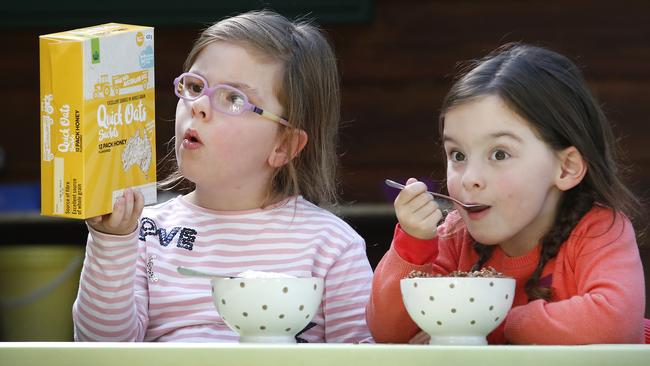Obesity experts decry Australian health star system’s sugar policy
Obesity experts want the national star rating system overhauled to include explicit detail on added sugar to help consumers, especially parents, to make healthier choices.
News
Don't miss out on the headlines from News . Followed categories will be added to My News.
Parents are being lured into buying high-sugar products thinking they are healthy under the national star rating system.
Obesity experts want the rating system overhauled to include explicit detail on added sugar to help consumers make healthier choices.
A five-year review of the health star rating system, which is nearing completion, recommends it only measure total sugars.
BRAIN TRAINING COULD BEAT SUGAR ADDICTION
SHOCKING AMOUNT OF SUGAR IN ICY POLES
ONE IN THREE VICTORIAN KIDS OVERWEIGHT
Dr Nick Fuller, from the Charles Perkins Centre at the University of Sydney, said the existing recommendations discriminated against healthy foods containing naturally occurring sugars.
“Naturally occurring sugars are not harmful, are found in nutritious foods like milk and fruit and vegetables and are good for you,” Dr Fuller said. “The health star rating system should give positive points for naturally occurring sugar and negative points for added sugar and the rating system should be mandatory across all foods.”
The review recommends the rating system remain voluntary, although only one in three supermarket products carry the stars.
The health star system was implemented in 2014 in response to the growing obesity epidemic but has been plagued with problems.

Jane Martin, from the Obesity Policy Centre, said added sugars, even if derived from fruit concentrate, needed to be factored into the star system.
She said foods such as Heinz Little Kidz Shreds, which are 60 per cent sugar (from fruit concentrate), were packaged as healthy.
“Products with fruit concentrate are being treated leniently and considered a positive, but the World Health Organisation says added sugar processed from fruit is the same as that processed from sugar cane,” Ms Martin said.
While Kellogg’s cereals carry star ratings, the company leaves them off children’s snack foods such as LCMs, which qualify for only half a star according to the Kellogg’s website.
“Things like fruit straps and products targeted at kids for school lunch boxes contain as much added sugar as confectionery,” Ms Martin said.
“We looked at cereals considered high in sugar — more than 15 grams of sugar per 100 grams — and the impact of the changes proposed on the health star ratings on those products.
“We found that there would be minimal changes to the ratings and some would keep their current rating, which we believe is too high.”

A ratio of 15g of sugar per 100g equates to four teaspoons of sugar.
Mount Evelyn mother Erene Cook said hidden sugars made it difficult to monitor what her three children ate.
“It’s astonishing how much sugar is in something like breakfast oats, which you’d assume would be a healthy choice,” Mrs Cook said.
“Transparency around things like added sugar and salt would make it a lot easier for parents.”


